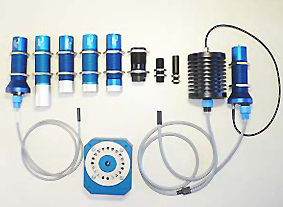
With the SPECTRO-3 series there now is a family of color sensors that have been specifically designed for “true-color” detection (“human visual reception”) and high switching frequency. The sensors can be used both in AC and in DC operation with integrated or externally controlled light source.
With the included SPECTRO3-Scope Windows® software illumination can also be turned off (OFF mode) with a simple mouse-click – which also allows the detection of the L*u*v* color value of self-luminous objects such as LEDs, automobile tail lights, fluorescent lamps, or e.g. the color of flames. Up to 31 colors can be output through the 5 digital outputs, the typ. maximum switching frequency is 30 kHz. Apart from a white-light source, a high-performance UV lights source also is available and allows color detection and differentiation of fluorescent colors without any problems.
Different front-ends make it possible to implement operating distances of almost 0 through to approx. 500 mm, with detection areas of a diameter of 0.5 mm to 100 mm. The use of optical fibres (approx. 50 different versions) allows applications in Ex areas (zone 0). Apart from the optical fibre types (FIO group) there also are the types of the DIL group (diffuser), which primarily are used for applications where the gloss effect of the objects to be inspected has to be suppressed. For objects with an extremely high gloss, however, it is recommended to use the POL group (polarisation filter), while the FCL group is especially used for applications requiring a differentiation between glossy and diffuse objects. If the application requires a color detection of small objects, the suitable sensors are of the FIO group or of the COF group (transmitter and receiver optics arranged cofocally), which allow a reliable detection of smallest objects at a distance of 30 mm or 50 mm, respectively.
O’Boyle
www.oboyle.ro


